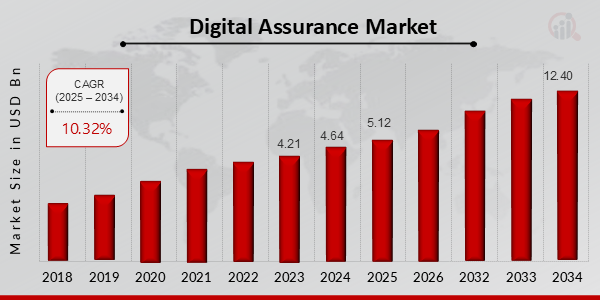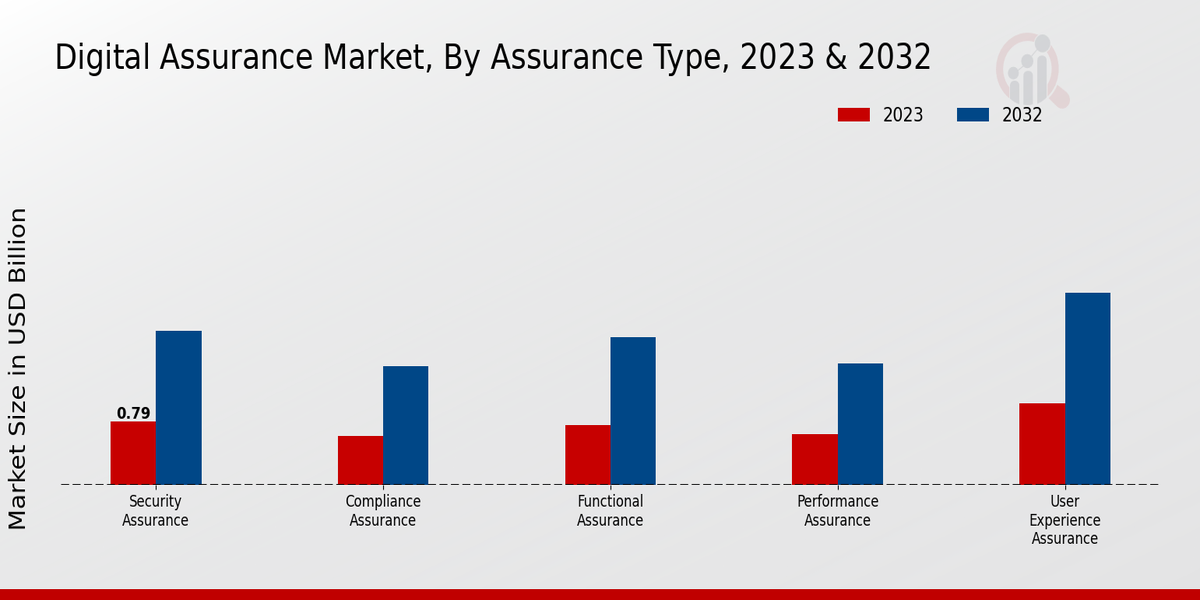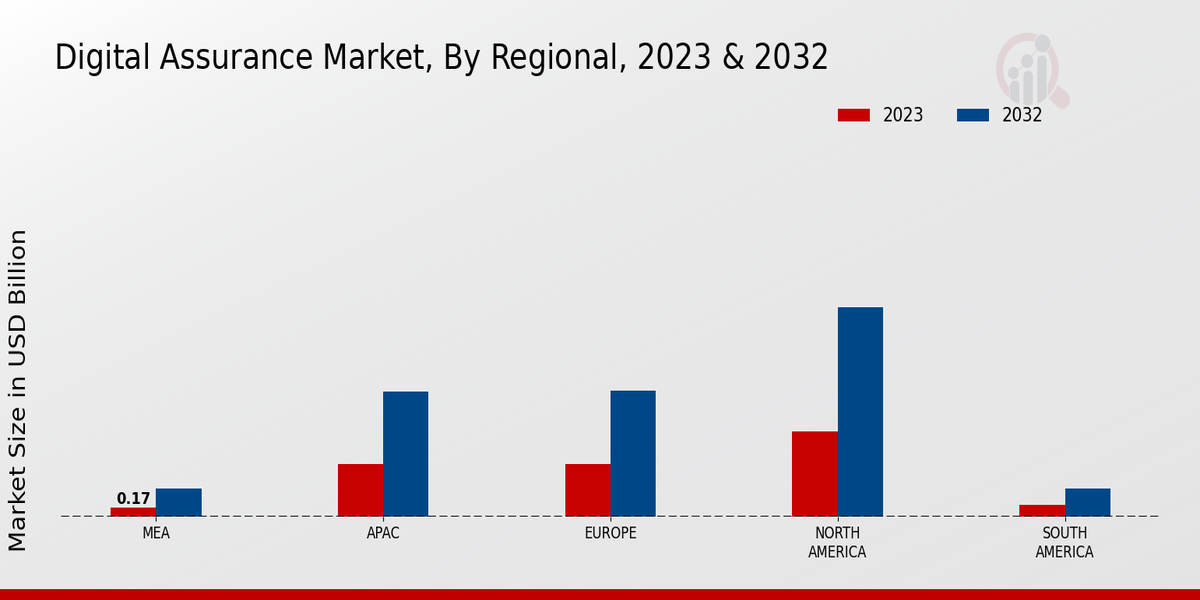Digital Assurance Market Overview
Digital Assurance Market is projected to grow from USD 5.12 Billion in 2025 to USD 12.40 Billion by 2034, exhibiting a compound annual growth rate (CAGR) of 10.32% during the forecast period (2025 - 2034).
Additionally, the market size for Digital Assurance Market was valued at USD 4.64 billion in 2024.
The digital assurance market is expected to grow from 3.82 (USD billion) in 2023 to 9.25 (USD billion) by 2032. The digital assurance market CAGR (growth rate) is expected to be around 10.32% during the forecast period (2024 - 2032).
Key Digital Assurance Market Trends Highlighted
The Digital Assurance Market is currently experiencing significant growth driven by the increasing adoption of digital technologies across various industries. Businesses are placing greater emphasis on ensuring the quality and security of their digital products and services, which is propelling the demand for robust digital assurance solutions. The rise in cyber threats and the need for compliance with regulatory standards is further pushing organizations to invest in digital assurance practices.
Additionally, the accelerated shift towards agile and DevOps methodologies necessitates the integration of testing and assurance processes early in the development cycle, making digital assurance vital for maintaining operational efficiency and customer satisfaction. Opportunities abound in the market as companies seek to capitalize on emerging trends like artificial intelligence and machine learning. These technologies are enhancing testing processes, allowing for faster identification of defects and improving overall product quality.
The increasing reliance on cloud services also presents a new avenue for digital assurance, as businesses transition their operations to cloud platforms, requiring assurance solutions tailored to these environments. Furthermore, there is a growing interest in automation within digital assurance, enabling organizations to streamline their processes and reduce time-to-market, creating a competitive edge. Recent trends indicate a rising emphasis on customer experience, compelling organizations to prioritize digital assurance as a means to deliver high-quality solutions. The need for businesses to remain agile is driving the demand for continuous testing and real-time feedback, transforming how digital assurance is perceived and implemented.
This focus on enhancing user experience through digital assurance underscores a shift in mindset, recognizing the paramount importance of quality in today's increasingly digital landscape. As organizations navigate these evolving dynamics, they will undoubtedly uncover new strategies to leverage digital assurance effectively, aligning with their business goals while addressing the complexities of a rapidly changing digital environment.
Figure 1: Digital Assurance Market size 2025-2034

Source: Primary Research, Secondary Research, MRFR Database and Analyst Review
Digital Assurance Market Drivers
Growing Demand for Software Quality Assurance
As businesses increasingly rely on software applications for their operations, the demand for software quality assurance within the Digital Assurance Market is on the rise. Companies understand that delivering high-quality software is paramount to maintaining customer satisfaction and ensuring operational efficiency. In today's digital landscape, where customers expect seamless and error-free experiences, any software malfunction can lead to significant negative consequences, including brand damage and revenue loss.
This increasing reliance on software creates an urgent need for comprehensive digital assurance solutions that encompass extensive testing, monitoring, and validation processes. The industry's evolution towards agile and DevOps methodologies has further amplified the requirement for effective digital assurance practices. As organizations strive to enhance their software development lifecycle, they must embrace digital assurance to safeguard their products against vulnerabilities and errors, which ultimately drives the expansion of the Digital Assurance Market.
Rapid Technological Advancements
Rapid advancements in technology, including artificial intelligence, machine learning, and automation tools, are significantly transforming the Digital Assurance Market. These technologies enhance testing accuracy and efficiency, enabling companies to achieve higher levels of assurance in their digital products. Automation in testing processes not only reduces time-to-market but also allows organizations to allocate resources more strategically.
This shift towards smart technologies is a major driver of growth, as businesses recognize the strategic value of integrating advanced digital assurance practices to stay competitive in a fast-paced digital environment.
Increasing Focus on Cybersecurity
With the surge in cyber threats, cybersecurity has become a crucial concern for businesses worldwide. The Digital Assurance Market is witnessing increased demand for solutions that ensure not only software functionality but also robust security mechanisms. Organizations are placing a premium on digital assurance services that incorporate security testing and vulnerability assessments to mitigate risks. The growing regulatory landscape surrounding data protection is also pushing companies to adopt comprehensive digital assurance strategies that encompass security protocols, further propelling market growth.
Digital Assurance Market Segment Insights
Digital Assurance Market Assurance Type Insights
The Digital Assurance Market, particularly within the Assurance Type segment, represents a substantial and rapidly evolving landscape. As part of this growth trajectory, the Assurance Type segment encompasses various critical components, including Functional Assurance, Performance Assurance, Security Assurance, Compliance Assurance, and User Experience Assurance, all of which play vital roles in shaping digital quality and reliability across industries. In 2023, the valuation for Security Assurance stood at 0.793 USD billion, and its significance was underscored by the rise in cyber threats, making it a dominant player poised to grow to 1.939 USD billion by 2032. The increased emphasis on data protection and regulatory compliance necessitates comprehensive Security Assurance frameworks to mitigate risks and safeguard information assets, hence driving its majority holding within the broader market landscape.
Compliance Assurance, with a valuation of 0.61 USD billion in 2023, reflected the growing need for organizations to adhere to stringent regulatory requirements across various sectors. As businesses confront heightened scrutiny from regulators, the value of Compliance Assurance is projected to escalate to 1.495 USD billion by 2032, providing firms with the necessary mechanisms to ensure adherence to laws and industry standards, thus serving as a critical area for investment.
Functional Assurance held a valuation of 0.753 USD billion in 2023, spotlighting its importance in verifying that applications and systems function as intended. This market area is anticipated to increase to 1.858 USD billion in 2032, as organizations prioritize operational efficiency and reliability in their digital offerings, prompting significant investment in ensuring that functionalities align with business needs. Performance Assurance, valued at 0.634 USD billion in 2023, is becoming increasingly significant as users demand optimized performance for applications and systems. This segment is on a projected path toward 1.535 USD billion in 2032, driven by the need to enhance user satisfaction and deliver seamless experiences, as enhanced performance directly correlates with user retention and loyalty.
User Experience Assurance led this segment with a valuation of 1.03 USD billion in 2023, highlighting its critical role in ensuring that end-users engage seamlessly with digital platforms. The substantial increment to 2.424 USD billion by 2032 illustrates the immense potential and significance of focusing on user experience in the competitive digital landscape. As businesses strive to meet customer expectations, investing in User Experience Assurance will continue to dominate their digital strategies.
In summary, the Assurance Type segment within the Digital Assurance Market encompasses vital categories that collectively enhance the quality, compliance, performance, and user satisfaction of digital platforms, representing significant growth opportunities in the rapidly evolving technology landscape. With an overall increasing market demand, these areas are poised for growth and transformation, reinforcing their importance within the broader Digital Assurance Market revenue landscape.

Source: Primary Research, Secondary Research, MRFR Database and Analyst Review
Digital Assurance Market Deployment Model Insights
The growing demand for efficient digital solutions has led to an increasing preference for various deployment models. Among these, the Cloud-Based approach has gained traction due to its scalability, cost-effectiveness, and ease of access, which cater to the rising needs of dynamic business environments. In contrast, the On-Premises deployment model remains significant for organizations that prioritize data security and have specific regulatory compliance needs.
This model allows greater control over internal processes and offers customization options tailored to business operations. The ongoing digitization across industries, coupled with the rising importance of quality assurance in software development and deployment, is expected to drive substantial growth within these deployment models, further contributing to the Digital Assurance Market revenue. As market growth accelerates, segmentation highlights not only the differences between these approaches but also encourages businesses to align their strategic plans with evolving digital assurance capabilities.
Digital Assurance Market Service Type Insights
This upward trend reflects the increasing demand for various service types. Consulting Services play a vital role in driving market growth by helping organizations align their digital strategies and ensure compliance. Testing Services, essential for maintaining software quality and reliability, dominate this segment due to the growing complexities of digital platforms. Monitoring Services are crucial for real-time performance assessment, ensuring system stability, while Training and Support Services enhance user competency, driving overall digital transformation.
The combination of these services reflects a robust market segmentation, contributing to the overall evolution of the Digital Assurance Market and addressing the rising challenges and opportunities faced by organizations in this digital age. Moreover, the Digital Assurance Market statistics illustrate how these services cater to essential operational needs, leading to improved customer satisfaction and streamlined processes across various sectors.
Digital Assurance Market Vertical Insights
The increasing reliance on digital solutions across IT and Telecommunications, Banking, Financial Services, Insurance (BFSI), Retail, Healthcare, and Manufacturing significantly drives this market. Each of these sectors recognizes the necessity for reliable digital assurance to enhance customer experience and maintain operational efficiency. The BFSI sector plays a crucial role due to stringent regulatory compliance and the critical nature of financial transactions, emphasizing the importance of digital assurance solutions.
The growing demand for e-commerce enhances the retail industry's position as businesses seek to ensure secure and efficient online transactions. Additionally, in healthcare, digital assurance addresses the need for data security and patient confidentiality, making it essential in this age of digital transformation. Manufacturing also benefits by leveraging digital solutions to optimize processes and ensure product quality. Overall, the Digital Assurance Market is shaped by these industry verticals, underpinning significant trends and growth drivers that highlight the increasing importance of digital assurance in today's interconnected world.
Digital Assurance Market Customer Type Insights
SMEs represent a significant portion of the market, driven primarily by their increasing reliance on digital channels to enhance operational efficiencies and customer experiences. Similarly, Large Enterprises dominate in terms of technology adoption, leveraging comprehensive digital assurance solutions to manage complex IT environments and ensure seamless integration of diverse systems.
These enterprises often face challenges such as stringent regulatory demands and the need for robust cybersecurity measures, propelling growth in the digital assurance space. The distinct needs of SMEs for agile, cost-effective solutions contrast considerably with the extensive requirements of larger organizations, which often seek comprehensive, enterprise-wide strategies. Therefore, the Digital Assurance Market revenue and growth opportunities are influenced significantly by the trends in both customer segments, indicating a promising trajectory for the market as it evolves to meet the varying demands and technological advancements across industries.
Digital Assurance Market Regional Insights
North America held the majority share with a valuation of 1.53 USD billion, reflecting its prominent role in technological advancement and digital transformation, while Europe closely followed at 0.95 USD billion. The Asia Pacific region demonstrates considerable growth potential, valued at 0.95 USD billion for the same year, driven by rapid digitalization and increasing adoption of assurance solutions.
South America, with a value of 0.22 USD billion, showed emerging opportunities, particularly as businesses enhance their digital infrastructures. The Middle East and Africa region, valued at 0.17 USD billion, indicates a nascent yet gradually expanding market with rising investments in IT services. Overall, the Digital Assurance Market segmentation highlights North America's significant dominance, while also recognizing the growing influence of Asia Pacific and Europe in shaping the market growth trajectory, presenting both challenges and opportunities in the global landscape.

Source: Primary Research, Secondary Research, MRFR Database and Analyst Review
Digital Assurance Market Key Players and Competitive Insights
The Digital Assurance Market is characterized by a dynamic and rapidly evolving landscape, where numerous enterprises are vying for dominance by leveraging advanced technologies and methodologies. This market predominantly focuses on ensuring the quality and performance of digital systems, applications, and services, thereby facilitating organizations in achieving their digital transformation goals.
The increasing reliance on digital solutions across various sectors has led to a heightened demand for assurance processes that encompass testing, compliance, and risk management, making it essential for companies to stay ahead of technological advancements and shifts in consumer behavior. As competition intensifies, companies operating in this space are compelled to innovate continuously and refine their service offerings to meet the diverse needs of their clients.
QASource has established a notable presence within the Digital Assurance Market by offering a comprehensive suite of testing services that cater to both startups and large enterprises. The company has gained a reputation for its expertise in delivering high-quality assurance solutions that encompass a range of testing methodologies, including functional, performance, security, and automated testing. QASource's unique strength lies in its specialized focus on agile development practices, which allows it to provide faster testing cycles and adapt to the evolving needs of its clients.
The company also places a strong emphasis on building long-term partnerships, ensuring that it can maintain a deep understanding of its customers' challenges, which in turn allows for tailored solutions that maximize efficiency and effectiveness. Moreover, its commitment to continuous learning and improvement further solidifies QASource’s position as a leader within the Digital Assurance segment, making it a competitive force to reckon with. Cognizant is another significant player within the Digital Assurance Market, recognized for its extensive services that blend innovative technologies with a customer-centric approach. The company's robust portfolio encompasses a broad spectrum of digital assurance offerings, including software testing, quality engineering, and assurance consulting.
Cognizant leverages its global reach and rich industry experience to deliver scalable solutions that address the complexities associated with digital transformation initiatives. An important strength of Cognizant is its investment in advanced analytics and automation tools that enhance testing efficiency and accuracy, ultimately leading to improved client satisfaction and outcomes. The firm’s ability to provide end-to-end digital assurance services, along with a commitment to leveraging emerging technologies, positions Cognizant as a formidable competitor in this space, enabling it to cater to a variety of industries and adapt to the unique requirements of its diverse clientele.
Key Companies in the digital assurance market Include
Digital Assurance Market Developments
Recent developments in the Digital Assurance Market indicate a growing emphasis on advanced technology integration and regulatory compliance as businesses navigate the complexities of digital transformation. Companies are increasingly investing in automated testing tools and AI-based solutions to enhance software quality and security, responding to heightened concerns over data privacy and cybersecurity threats. The rise of cloud computing and the proliferation of IoT devices further necessitate robust digital assurance strategies. Notably, some leading tech firms have rolled out collaborative platforms that enable continuous assurance processes, combining testing and monitoring in real time. Additionally, with the anticipated growth of the digital economy, there is a marked increase in demand for skilled professionals who can implement effective assurance methodologies.
As organizations strive for operational resilience and improved customer experiences, the digital assurance landscape continues to evolve rapidly, adapting to new challenges and emerging technologies. These trends signal a vibrant market poised for significant expansion, underscored by the need for organizations to ensure compliance and maintain trust in their digital offerings.
Digital Assurance Market Segmentation Insights
-
Digital Assurance Market Assurance Type Outlook
- User Experience Assurance
-
Digital Assurance Market Deployment Model Outlook
-
Digital Assurance Market Service Type Outlook
- Training and Support Services
-
Digital Assurance Market Vertical Outlook
- IT and Telecommunications
- Banking, Financial Services, and Insurance (BFSI)
-
Digital Assurance Market Customer Type Outlook
- Small and Medium Enterprises (SMEs)
-
Digital Assurance Market Regional Outlook
|
Report Attribute/Metric
|
Details
|
|
Market Size 2024
|
4.64 (USD Billion)
|
|
Market Size 2025
|
5.12 (USD Billion)
|
|
Market Size 2034
|
12.40 (USD Billion)
|
|
Compound Annual Growth Rate (CAGR)
|
10.32% (2025 - 2034)
|
|
Report Coverage
|
Revenue Forecast, Competitive Landscape, Growth Factors, and Trends
|
|
Base Year
|
2024
|
|
Market Forecast Period
|
2025 - 2034
|
|
Historical Data
|
2019 - 2023
|
|
Market Forecast Units
|
USD Billion
|
| Key Companies Profiled |
QASource, Cognizant, NTT Data, Fuji Xerox, Wipro, Capgemini, Accenture, IBM, Deloitte, HCL Technologies, Landis+Gyr, Atos, TCS, KPMG, Infosys |
| Segments Covered |
Assurance Type, Deployment Model, Service Type, Industry Vertical, Customer Type, Regional |
| Key Market Opportunities |
Increased cloud adoption Regulatory compliance demand Growth in mobile transactions AI-driven testing tools Enhanced cybersecurity integration |
| Key Market Dynamics |
Increasing digital transformation initiatives, rising cybersecurity threats, demand for compliance and governance, growing focus on customer experience, and adoption of automation technologies |
| Countries Covered |
North America, Europe, APAC, South America, MEA |
Frequently Asked Questions (FAQ) :
The Digital Assurance Market is expected to be valued at 12.40 USD billion by 2034.
The Digital Assurance Market is projected to grow at a CAGR of 12.40 from 2025 to 2034
North America is expected to hold the largest market value, estimated at 12.40 USD billion in 2034
The Functional Assurance segment is projected to be valued at 12.40 USD billion in 2034
Key players in the market include QASource, Cognizant, NTT Data, and Accenture, among others.
The Security Assurance segment is expected to be valued at 12.40 USD billion by 2034
User Experience Assurance is projected to reach 12.40 USD billion in 2034
The Compliance Assurance segment is expected to be valued at 12.40 USD billion by 2034
The APAC region is expected to increase to 12.40 USD billion by 2034, indicating significant growth.
The Performance Assurance segment is expected to reach a valuation of 12.40 USD billion by 2034

















